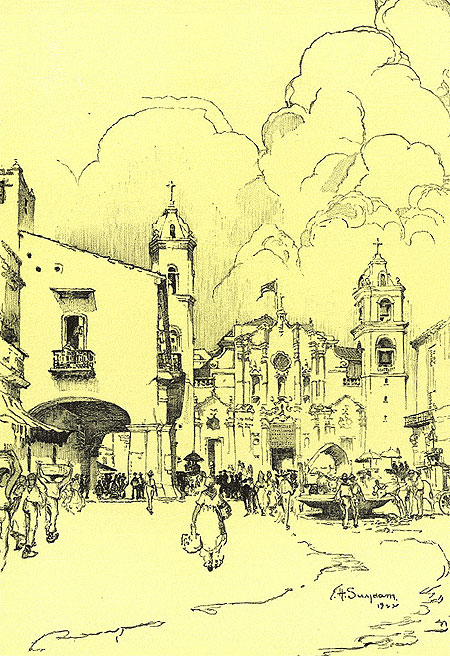James C. McKinley Jr., “At Cuba Helm, Castro Brother Stays the Course,” The New York Times, February 25, 2008:
HAVANA — Raúl Castro, who has labored in the shadow of his brother Fidel since the days of their revolution, became Cuba’s new president on Sunday, ending his brother’s 49-year rule and washing away hopes on this Communist island that a younger generation might take power.

“An Artist,” “Three Weeks in Cuba,” January 1853:
I am neither historian nor philosopher, prophet nor politician; yet if I read history aright, and understand the philosophy of its teachings, it needs not the perception of a prophet to foresee the political condition of Cuba, perhaps ere the earth shall have made another circuit of the ecliptic. There appears to be a higher law than the savage enactments of selfish men, at work in the hearts of the Cubans, and this energy, aided by official stupidity, is rapidly deepening the grave of Spanish misrule over one of the most beautiful domains of earth. With free institutions and an intelligent people, Cuba, instead of presenting to the world the spectacle of a garden in ruins–its hedge’ broken down, and its shrubs and plants and fruitful vines crushed and ravished by “the wild boar out of the wood,” might exhibit a garden in richest bloom and generous fruitage, the delight of its husbandman and the pride of the Western world.
Alfred H. Guernsey, “Editor’s Table,” March 1859:
The first reason that points to the acquisition of Cuba is obviously the intrinsic value and the great resources of the island. If Cuba were a sand-bank, if it were a rock, the case would be very different. But the island is one of the jewels of the earth. It is the “gem of the Antilles.” All testimony concurs as to the fertility of its soil-the loveliness of its climate–its immense capacities if properly developed. Its staples–coffee, raised nowhere in the Union, sugar and tobacco, produced very partially–may be said to be all absolute additions to the wealth of the United States. On the other side, an open commerce with Cuba would furnish a large and prosperous outlet to many branches of American manufacture; and under a system of easy and unrestricted intercourse its delightful climate would afford a welcome escape from the rigorous cold and chilling fogs of the winters of the Northern States. That Cuba would be an immense positive addition to the wealth and resources of the United States can not be doubted; and that, in an industrial point of view, it would be more to the United States than it ever can be to Spain is as little to be questioned. It is not now to be argued that the American policy of stimulating individual enterprise has an effect on the development of national wealth and material resources such as no other country can pretend to.
C. Wright Mills, “‘Listen, Yankee’: The Cuban case against the United States,”, December 1960:
1
We Cubans, we’re a do-it-yourself outfit. We’re not capitalists and we’re not building a capitalist society in Cuba today. Neither are we building a Stalinist society. We ourselves don’t know quite what to call what we are building, and we don’t care. It is, of course, Socialism of a sort. We’re not a bit afraid of that word–and why ever should you be?
There is one more thing that you must understand about us young intellectuals who’ve led this Cuban revolution: Since we did not belong to the old left intelligentsia who had gone through Communism and been disillusioned with Stalinism and with the purges and the trials and the thirty-five years of all that, we’ve had one enormous advantage as revolutionaries: We’ve not gone through all that terribly destructive process; we have not been wounded by it. We’ve never had any “God That Failed.” We don’t have all that cynicism and futility about what we’re doing and about what we feel must be done.
That’s the big secret of the Cuban revolutionary. We are new men, and we are not afraid to do what must be done in Cuba.
“The Little Engine that Dialectically Must,” February 2004:
From lessons from textbooks written for Fidel Castro’s literacy campaign, begun in 1961; the books are still in use in many Cuban schools. Today, 97 percent of the Cuban population is literate, and Castro is helping Venezuelan president Hugo Chavez design a literacy program for his country . Translated from the Spanish.
Exercise 2:
Let’s first read and then write: “The main square looks very pretty. The people’s militia marches by. Thousands of bandannas saluting. Long live Fidel! The militiaman has a rifle. He loves peace. In good hands, a rifle is good. Young and old united, we swear alongside Fidel. Together we will defend Cuba. They’ll never defeat us again!” Copy in your best handwriting: “They’ll never defeat us again!”


